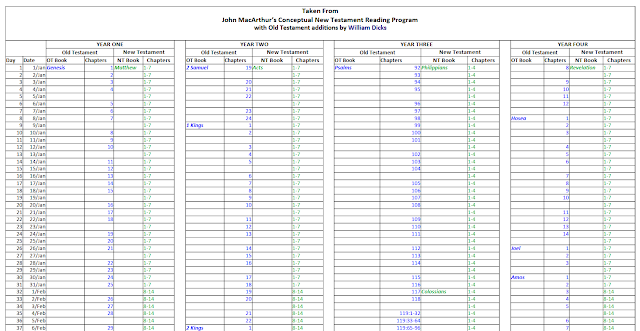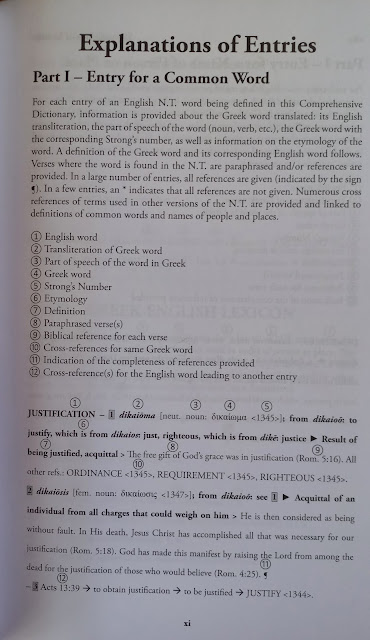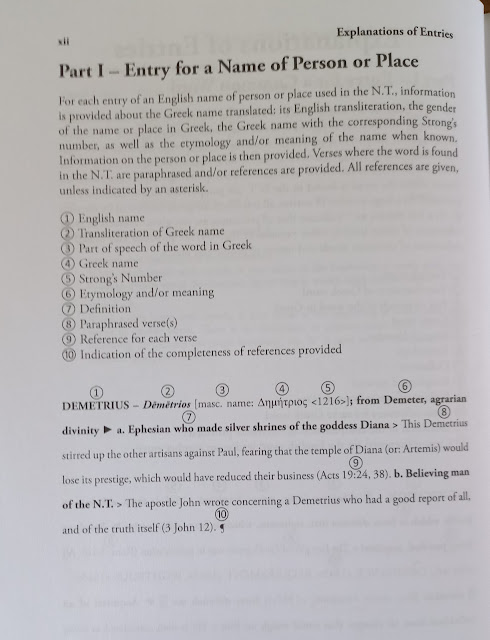I have recently discovered the usefulness of the Blue Letter Bible online and phone app (Android, iPhone) service. It is jam-packed with useful tools!
Wednesday, January 04, 2023
Blue Letter Bible for Online Bible Reading and Bible Study
Friday, July 29, 2022
A Study on the Old Testament Book of Daniel
Daniel, probably a teenager, along with his friends, Hananiah, Mishael, and Azariah, were taken into exile to Babylon by Nebuchadnezzar, king of Babylon, in the third year of the reign of Jehoiakim, king of Judah. From the time of the first captivity around 605 B.C., until the time of Daniel's last entries in the book bearing his name, are about 70 years. The last date that he mentioned is "the third year of Cyrus king of Persia" (10:1), around 536 B.C.
Sunday, April 17, 2022
Bible Reading Schedule to Solidify your New Testament Knowledge
I know! This is the wrong time of the year to get people to start a Bible reading schedule. Is it not meant for New Year's resolutions? Yes and No! A Bible reading schedule can be started any time of the year. As Christians, we walk in the renewing power of the Holy Spirit by grace through faith. It is a daily walk, with daily renewal.
In less than 90 days I will start the Bible reading program I will suggest below. I wrote in the beginning of the year about some Bible reading programs that you could follow.
Saturday, February 26, 2022
Birthday Books
Even though my birthday was waaayyy back on 11 January, I was only able today to go spend the money I received on my birthday. I buy almost all my physical, paper books from Augustine Bookroom, and that is where I bought these books today.
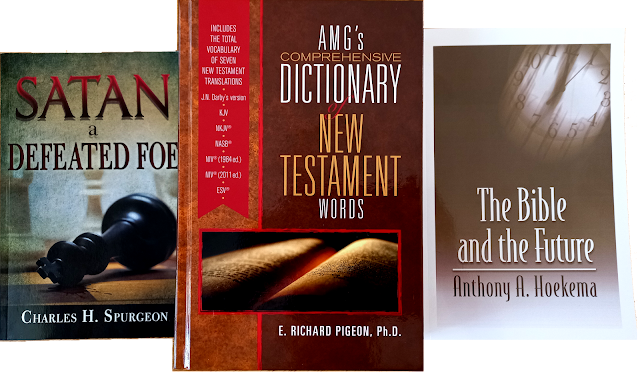 |
| My Birthday Books |
"As a premier provider of Christian books and Bibles that help the average person understand the Bible in its original languages, AMG Publishers is proud to present this important reference tool. This volume will help you discover the rich meaning of the words in the Greek New Testament."PART ONE contains defintions (sic) or cross-references for more than 8,000 English terms, definitions that are based on the meaning of the more than 5,500 Greek words in the Greek New Testament. Unlike some other tools, where you have to know the Greek alphabet or must first look up a Strong’s number before you get to the real meaning of things, this dictionary is organized alphabetically by the English words. It covers all the common words and all the names of people and places found in the New Testament, and most often lists all the Scripture references where each English word is used. The primary entries also list the Greek words and Strong’s numbers so that you have them as a reference to other works."PART TWO is a simple lexicon of the Greek New Testament words, organized by Strong’s numbers, defined by terms found in Part One. Most lexicon entries list the other English New Testament words that translators used for that Greek word. To dig deeper, look up those other English words in Part One."
- Why was J. N. Darby's vocabulary included in this book? Who uses this translation?
- The possibility exists for someone who does not know Greek, in using this book, such a person could start thinking that they know enough about a word or words in the New Testament to proclaim that "knowledge" far and wide as set in stone. The same problem exists with Strong's Concordance. These types of tools give just enough information to make people dangerous in their knowledge. Please understand that I am not shooting this book down for the "Greekless" user. All I am trying to do is to warn "Greekless" users not to push their knowledge picked from these tools too far.
Saturday, January 15, 2022
1500 Consecutive Days of Reading the Bible
Five hundred and twenty-five (525) days ago I published a post about having read the Bible on the YouVersion mobile Bible app each day for one-thousand (1000) consecutive days. I have now been reading the Bible each day on the Bible app for 1525 consecutive days.
Since then I have completed one other plan and I am more than halfway through the next.
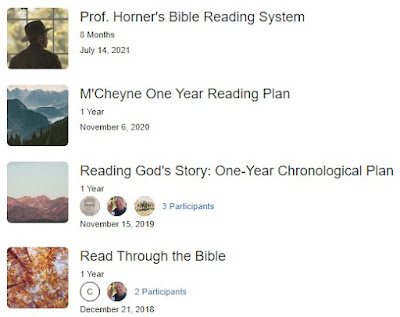 |
| Completed Bible Reading Plans on YouVersion |
The last completed reading plan on the list is Prof. Horner's Bible Reading System. In this system, you read 10 chapters a day with each chapter from a different book of the Bible. If you read every day, you will complete the plan in 8 months. To put things in perspective, if you start from the beginning again, after your first year on this program, you would have "read through all the Gospels four times, the Pentateuch twice, Paul’s letters 4-5 times each, the OT wisdom literature six times, all the Psalms at least twice, all the Proverbs as well as Acts a dozen times, and all the way through the OT History and Prophetic books about 1½ times." See the plan's PDF here. This is a very enriching program, but also very intense. If you are a fast reader, unlike me, this will be no problem for you.
Currently, I am busy with the Canonical plan. This plan is a simple plan to read the Bible from cover to cover starting in Genesis, and ending with Revelation, in the order the books are found in the Bible.
When I have completed the Canonical plan, I am going to start with the John MacArthur plan. This plan is very New Testament oriented. In this plan, you will read the same 7-8 chapters each day for a month before moving on to the next set of chapters. You can really start the plan with any New Testament book. You can start with reading 1, 2, 3 John every day for a month, then move on to Matthew 1-7 for the next month followed by Matthew 8-14 the month after that. I will start with Matthew, and work my way through to Revelation.
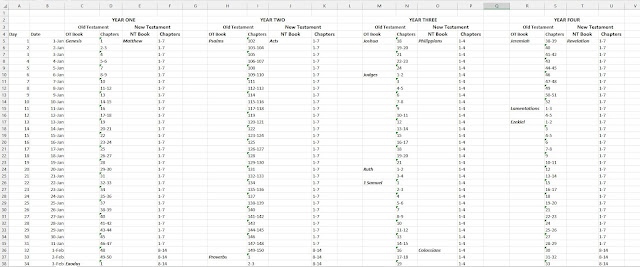 |
| Example of the John MacArthur Reading Plan |
The way that I set it up as can be seen in the image above is to read 1-2 chapters of the OT a day, and then 7-8 chapters in the NT. It will take 3 years and 3 months to complete this plan. When you are done with this plan, you would have read through the NT about 30 times, and the OT twice (Americans: two times 😂). By reading the NT this way, you will really get to know the NT. The idea is to make it part of you, not just getting to know it, or finishing a plan. This plan is NOT available on any Bible reading app as far as I know, so completing it will not give you a plan completion medal.
Reading the Bible consistently is very important to every Christian, especially to read all of it. Apps like YouVersion can be a great help in doing so, but on the other hand, it can also be a distraction from eating the meat of the Word. Mobile Bible apps have all kinds of reading plans. There are 5-day plans, topical plans, seasonal plans, etc.
 |
| YouVersion Bible Reading plans |
My contention is that if you as a Christian are not reading through the Bible on a regular basis, you are not being fed enough of God's Word. Reading a little plan here or there, or a chapter here or there, or a verse here or there, will not feed you sufficiently.
Many of these plans are set up around a certain topic. If you only read topical plans, you are probably only reading those that you deem relevant to you. Topical plans are not bad in themselves at all, but when we only read those type of plans, we will become malnourished.
Remember, in God's eyes, ALL of Scripture is relevant to us, not just certain topics.
I would like to challenge each one of you to use a plan that will guide you from cover to cover through the Bible in a year. If you think it may be too much, then try a 2-year plan. There are many plans out there. Most mobile Bible apps have such plans to choose from.
If you don't want to use a Bible app to read the Bible, and prefer to use a physical Bible, check out the plans at Ligonier.
Finally, you can generate your own plan by using the Bible Reading Plan Generator. With this web app, you can generate your own reading plan by selecting all kinds of options: Time Frame, Format (Calendar, List, Weeks, Books, etc), Bible Books (All, OT, NT, selected books), Chronological, and more.
Tolle lege! Tolle lege!
Sunday, August 15, 2021
How Should Christians Respond When Government Bans Church Services?
Thursday, December 31, 2020
Top 10 - Um - Just Books I read in 2020
When I thought of this blog post, I wanted to do a top 10 books that I read in 2020, but the fact is that I read slowly, and this year was one of the busiest work years of my life! In the midst of the COVID-19 pandemic, our team simply didn't have enough time to complete our project. And, in the midst of this, I needed to find time to read.
Another reason that I finish books so slow, is that I read several books at the same time. And when I say "several," I do not mean 2, 3, or 4 at a time. More like triple that at any one given moment.
Since this is not a top 10 post, they are numbered in the order that I finished reading them.
- How to Study Your Bible (Kay Arthur), This book teaches the Inductive Bible Study Method. HSYB is certainly a very useful book. The Bible student can use this book to go as deep as he wants to go. However, there are some caveats to some of the tips the author provides. To read about the book and about the caveats in the book, follow the link in the title of the book to read my review on the book.
- Kingdom Come: The Amillennial Alternative (Sam Storms), This was my 2nd time reading Kingdom Come by Sam Storms. The first time was in 2013. I actually enjoyed the book now more than then. Storms has a clear way of explaining eschatological concepts through Scripture. Anybody who really wants to learn about amillennialism should read this book. In fact, anyone who is interested in eschatology, teaching of the end-times, should read this book!
- The Oracle: The Jubilean Mysteries Unveiled (Jonathan Cahn), Fictional speculation at its
bestworst! I simply could not get into this book. - The Book of Revelation (Robert H. Mounce), This is a fair commentary on the book of Revelation, but there are better commentaries on Revelation. This commentary is part of The New International Commentary on the New Testament series of commentaries.
- Revelation (Joel Beeke), This is not a very in-depth commentary on Revelation, but it does aim in the right direction. This commentary is part of the Lectio Continua Expository Commentary on the New Testament series.
- The Basic Steps of Bible Study: Getting Started (Kay Arthur), This is simply a subset of HSYB above. Skip this one and to straight to HSYB.
- Revelation (Gordon D. Fee), This is a worthwhile commentary, but in my opinion, he still doesn't handle the symbolism, and imagery of Revelation well enough.
- 1, 2, 3 John, Revelation (Earl F. Palmer), The Revelation commentary in this set is average. At times it seems good, but at other times it leaves the reader feeling that there is just not enough. It is part of The Communicator's Commentary series.
- Revelation: The Spirit Speaks to the Churches (James M. Hamilton Jr.), This is not a technical commentary, and those who want to find a more devotional commentary with application sections, will find this one to their taste. I enjoyed this commentary, and is worthwhile purchasing.
- How to Study the Bible (Richard L. Mayhue), This is a fine book to start learning to do Bible Study, and there is much to learn from it.
- Hebrews through Revelation (Frank E. Gaebelein, general editor; Alan F. Johnson, author on the Revelation commentary), Of the non-technical commentaries, this one is fairly well done. It is perhaps a bit dated, but still fine as a commentary. It is volume #12 of The Expositor's Bible Commentary series.
- Christianity Through the Centuries: A History of the Christian Church (Earle E. Cairns), I think it is very important for Christians to know the history of the church. The original edition was my Church History textbook in Bible College. I decided to read it again. This is the 3rd edition, and it takes church history into the 1990s. It is a worthwhile church history book to have on your shelves.
- A Case for Amillennialism: Understanding the End Times (Kim Riddlebarger), It took me a while to get into this book. However, once I got past all the plugging that the author did for Covenant Theology, the book became what the title promised. The author seems to think that Amillenialism cannot stand on its own two feet without it being propped up by Covenant Theology. This is simply not true. A better book to read would be Kingdom Come by Sam Storms.
- Progressive Covenantalism: Charting a Course between Dispensational and Covenantal Theologies (editors: Stephen J. Wellum, Brent E. Parker), I enjoyed this book very much, and if you have read Kingdom through Covenant: A Biblical-Theological Understanding of the Covenants by Peter J. Gentry and Stephen J. Wellum, then you will enjoy this one too. Both these books are break-aways from Dispensational Theology (7 Dispensations, rapture, and other fairy tales), and also from Covenant Theology. It is very similar to New Covenant Theology with a few differences.
- An Introduction to the Greek New Testament, Produced at Tyndale House, Cambridge (Dirk Jongkind), This is a short book on subjects such as textual criticism, and how Tyndale made their textual choices in order to come to what they believe is the best Greek NT text. It is an easy book to read, and I think that most people will understand it. I have a copy of the Tyndale House Greek New Testament (THGNT), and it is very close to the Nestle-Aland 28th edition (NA28) of the Greek NT, and the United Bible Societies 5th edition (UBS5) of the Greek NT.
- How to Study the Bible (Robert M. West), This is a very short book on the subject of Bible study, and is good for someone new to Bible study.
- The Book of Revelation: A Commentary on the Greek Text (G. K. Beale), This is a fairly technical commentary based on the Greek text of the book of Revelation. It handles textual variants where necessary. This is by far the best commentary that I used through 2020 in the study of Revelation. Throughout the year I made use of 10 commentaries on Revelation, and Beale's commentary is completely above the rest. He goes into the symbolism of Revelation, and handles myriads of allusions that John made to the Old Testament to bring his message across. One thing that I learnt from Beale, is that without a good knowledge of the OT and its prophetic symbolism, one's interpretation will end up skewed by preconceived ideas about the end-times. Beale's commentary is a book of 1245 pages; so, as a commentary, it is not for the faint-hearted. However, if you do the hard work of working through this commentary, you will definitely be blessed and educated on Revelation.
- New Testament Textual Criticism: A Concise Guide (David Alan Black), I think Black did an excellent job introducing the reader to textual criticism. If you have no idea concerning the subject, this is the place start! Definitely recommended to those interested in the subject, but do not know where to start.
Wednesday, August 26, 2020
Learning Biblical Greek has never been more accessible, and is needed more than ever!
When I studied at Bible College in the second half of the 1980s, we had to learn Biblical Greek, and I
loved it! It took a lot of work and dedication, but at the end of the 3 semesters of Greek that year I had an average of 96%. I found it fascinating!
But, like they say, "If you don't use, you lose it!" I got married in 1990, and started working at a massive state company through which I studied software development, and I've been in software development ever since. Through the years, because of disuse, I had forgotten much of what I learnt about New Testament Greek. I don't know how many times I tried to pick it up again. Don't get me wrong! I could no longer handle it smoothly, differentiating between different verb forms, nouns, etc. Yet, I was quite capable of helping myself when I came across something in the New Testament that I wanted to check against the Greek. I had the resources, and I knew how to use them, but I couldn't pick up a Greek New Testament and just translate as I read.
Saturday, August 08, 2020
1000 Consecutive Days of Reading the Bible
Tuesday, June 16, 2020
Review: How to Study Your Bible by Kay Arthur
Tuesday, May 12, 2020
Allusions in the Book of Revelation to the Old Testament
Sunday, April 05, 2020
Lockdown church service at home
We are 5 in our home. Together with myself, there is my wife, my daughter (25), my son (23), and my mother-in-law.
We sat together and prayed, and then afterwards we watched a sermon by John Piper, called "Seven Reasons We Must Pursue Supreme Satisfaction in God."
Specifically, in a time such as ours with the COVID-19 disease sweeping across the world, having killed over 65,000 and infected more than 1,200,000 people already, we look at life with new eyes.
That is why I felt that this sermon of John Piper's was perfect for the occasion. We as humans have the tendency of finding satisfaction in all kinds of earthly endeavours, things that have pushed Christ down the ladder a rung or ten. Things like money, entertainment, sport, prestige, etc. But, right now, no matter who you are or your position in life, SARS-CoV-2 attacks indiscriminately, ignoring who you are.
It is for this reason we must seek our complete pleasure in Christ, and Christ alone!
This isn't always easy. On Friday in an online meeting with the rest of our company, our MD informed us that since the company group wants to be known as a people's company, that people are our greatest asset, the board has decided that in order to make sure that people aren't laid off due to COVID-19 and the lockdown, that everyone in the group will have to take a 20% pay cut for at least 2 months. Obviously, we do not want anyone laid off in the group because of this situation. As a company in the group, we unanimously agreed that it is a better idea than laying off people across the group. With budgets already stretched to the max, this is not an easy one to take; but, it is a necessary step! It is in times like these that we learn where our pleasures are. Are they found in things, or in Christ!
Where do you find satisfaction?
This sermon of Piper's can be found on the Desiring God website with the video and text.
Saturday, March 28, 2020
Free books to read during the COVID-19 pandemic
 |
| Image of the SARS-C0V-2 virus. |
When we watch the news on TV, or if we check out the latest news at our favourite news website, we continue to see the number of infections rising, along with deaths related to the SARS-CoV-2 virus, the cause of COVID-19.
To think that since the outbreak of this virus, 617,063 people have been infected, and 28,376 have died. The staggering numbers of people affected by this virus may make us live in fear, panic, even dread. However, we must also look at how many people have already recovered: 137,336! Currently, the death rate stands at 4.6%, and the recovery is at 22.25%.
Thursday, January 09, 2020
My Bible Reading Plan for 2020
I haven't been blogging like I would like to, and I am sorry for that. Life has been very hectic in the last 5 years, really.
I'm a bit late in the uptake of this series of blog posts this year. Others have already written blog posts about their Bible reading programs for this year.
Tuesday, February 05, 2019
REVISED “HATE SPEECH BILL” NOW OPEN FOR COMMENT (DEADLINE EXTENDED)
The call for comments on the revised draft of the PREVENTION AND COMBATING OF HATE CRIMES AND HATE SPEECH BILL (“the Bill”) is now open until 15 February 2019 (final date extended from 31 January to 15 February 2019).
Religious Freedom at Risk
Most notably, clause 4(1) of the Bill makes “hate speech” a crime – with potentially dire repercussions from a freedom of speech, freedom of expression, and freedom of conscience point of view. The offence will make any speech (as well as the distribution of such speech) that could be construed to be “harmful” on a wide range of subjective grounds, a criminal act carrying a jail sentence of up to three (3) years.
Religious Exemption Clause is only Valid For “Pulpits”
While we are encouraged by the inclusion of a “religious exemption clause” (in clause 4(2)(d)) in the Bill – as advocated for by FOR SA, and the many religious organisations and groups who previously made submissions on the Bill – concerns regarding criminalisation of free speech remain. Especially as the Deputy Minister of Justice noted that the religious exemption clause would only apply to “pulpits”.
Even if you have previously made a submission on the Bill (to the Deputy Minister of Justice), please do make a submission again (this time, to the Parliamentary Portfolio Committee on Justice). Written submissions must be received by 15 February 2019, and can be emailed to the Committee Secretary, Mr Vhonani Ramaano (vramaano@parliament.gov.za).
Please use the TEMPLATE SUBMISSION FORSA have prepared to assist you in commenting / objecting to the provisions of the Bill which will significantly and negatively impact on freedom of (religious) expression. Sunday School teachers, worship leaders, Bible Study groups and social media commentators are all threatened by this bill.
Redefining Hate Speech
The Bill's extremely broad definition of hate speech under section 4 of the Bill includes in its scope any communication which is considered "abusive or insulting" and intended to "bring into contempt or ridicule" a person, or group of persons, on the basis of their gender, sex, sexual orientation, gender identity, etc. This includes email, or social media communications as well as teachings from a pulpit, or in a Bible study. Instead of an objective definition of what constitutes "hate speech" (for example those who sing "Kill the Boer! Kill the Farmer!" or those advocating Islamic Jihad to behead Christians), this bill seeks to focus on subjective definitions of where an individual may feel offended, even if that was not the intention. Yet, blasphemy and pornography are considered free speech! However, free speech is to be criminalised by this bill!
"He who justifies the wicked, and he who condemns the just, both of them alike are an abomination to the Lord." Proverbs 17:15
See also:
www.SAvotersguide.org
Ten Principles for True Freedom
Religious Freedoms at Risk in South Africa
Rise of the GayGB and the Pink Inquisition
Through the Looking Glass - An Insight into the Racist Agenda
Promoting Racism and Intolerance in the Name of Confronting Racism
The Heart and Soul of Karl Marx
Racism - Rhetoric and Reality
Do Not Take God’s Name in Vain
Africa Christian Action
PO Box 23632
Claremont
7735 Cape Town
South Africa
Tel: 021-689 4481
E-mail: info@christianaction.org.za
Web: www.christianaction.org.za/
Join us on Facebook and Twitter




